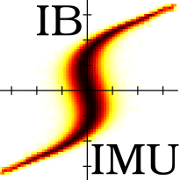ParticleIterator< PP > Class Template Reference
Particle iterator class for continuous Vlasov-type iteration. More...
#include <particleiterator.hpp>
Classes | |
| struct | ColData |
| Mesh intersection (collision) coordinate data. | |
Public Member Functions | |
| ParticleIterator (particle_iterator_type_e type, double epsabs, double epsrel, bool polyint, uint32_t maxsteps, double maxt, uint32_t trajdiv, bool mirror[6], ScalarField *scharge, const Efield *efield, const VectorField *bfield, const Geometry *g, Particle< PP > *first) | |
| Constructor for new particle iterator. | |
| ~ParticleIterator () | |
| Destructor. | |
| void | enable_nsimp_plasma_threshold (const ScalarField *epot, double phi_plasma) |
| Enable plasma threshold model for NSIMP plasma model. | |
| void | get_statistics (uint32_t &end_time, uint32_t &end_step, uint32_t &end_out, uint32_t &end_coll, uint32_t &end_baddef, uint32_t &sum_steps) |
| Get particle iterator statistics. | |
| void | operator() (Particle< PP > *particle, Scheduler< ParticleIterator< PP >, Particle< PP >, Error > &scheduler) |
| Iterate a particle from start to end. | |
Detailed Description
template<class PP>
class ParticleIterator< PP >
Particle iterator class for continuous Vlasov-type iteration.
- Todo:
Detailed documentation needed.
PIC style iterator needed.
Constructor & Destructor Documentation
| ParticleIterator< PP >::ParticleIterator | ( | particle_iterator_type_e | type, | |
| double | epsabs, | |||
| double | epsrel, | |||
| bool | polyint, | |||
| uint32_t | maxsteps, | |||
| double | maxt, | |||
| uint32_t | trajdiv, | |||
| bool | mirror[6], | |||
| ScalarField * | scharge, | |||
| const Efield * | efield, | |||
| const VectorField * | bfield, | |||
| const Geometry * | g, | |||
| Particle< PP > * | first | |||
| ) | [inline] |
Constructor for new particle iterator.
New particle iterator is initialized with given settings.
- Parameters:
-
type Particle iterator type used epsabs Absolute error limit in iteration epsrel Relative error limit in iteration polyint Interpolation type to use. True means use polynomial interpolation, false means use linear interpolation maxsteps Maximum number of steps to take before particle is killed maxt Maximum flight time for a particle trajdiv Trajectory saving divisor. Only every trajdiv:th particle trajectory saved. mirror Particle mirroring on surfaces scharge Space charge field to save to efield Electric field in the geometry bfield Magnetic field in the geometry g Geometry definition first Pointer to first particle of the database.
The particle iterator is given the settings for calculation and geometry, electric field and space charge map to build. Pointer to first particle in the particle database vector is used to calculate the particle number from the particle memory location.
| ParticleIterator< PP >::~ParticleIterator | ( | ) | [inline] |
Destructor.
Member Function Documentation
| void ParticleIterator< PP >::enable_nsimp_plasma_threshold | ( | const ScalarField * | epot, | |
| double | phi_plasma | |||
| ) | [inline] |
Enable plasma threshold model for NSIMP plasma model.
| void ParticleIterator< PP >::get_statistics | ( | uint32_t & | end_time, | |
| uint32_t & | end_step, | |||
| uint32_t & | end_out, | |||
| uint32_t & | end_coll, | |||
| uint32_t & | end_baddef, | |||
| uint32_t & | sum_steps | |||
| ) | [inline] |
Get particle iterator statistics.
Returns statistics in variables end_time, end_step, end_out, end_coll, end_baddef and sum_steps. See ParticleDatabase for more details about the particle iterator statistics.
| void ParticleIterator< PP >::operator() | ( | Particle< PP > * | particle, | |
| Scheduler< ParticleIterator< PP >, Particle< PP >, Error > & | scheduler | |||
| ) | [inline] |
Iterate a particle from start to end.
Iterate particle particle from start to end. This function is called by the Scheduler scheduler, which provides particles to be solved. Reference to scheduler is provided for the possibility to add secondary particles to particle database.
The documentation for this class was generated from the following file:
